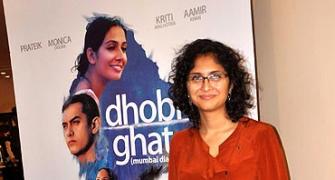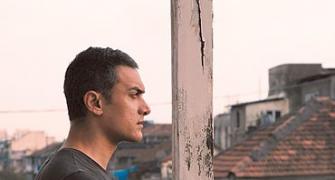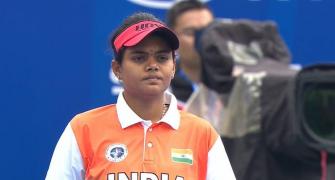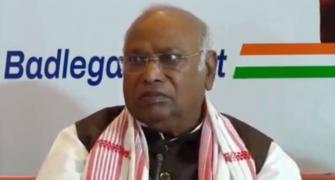'I guess things happen when they have to happen.'
'And the film got delayed by COVID a little bit. But yeah, it's been a decade which I do not regret.'
'I feel like I have grown so much, as an artist, as well as just a human being.'
'So much life experience to channel into films that I think is an advantage almost.'

Thirteen years ago, Kiran Rao came to the Toronto International Film Festival with a small little indie film called Dhobi Ghat. She was accompanied with her then husband as well as producer-actor Aamir Khan and a young Prateek Babbar, playing a significant supporting role.
Dhobi Ghat was a critical success, but Rao got involved in other projects, and did not direct a film until now.
Early this September, Rao was back at TIFF with her sophomore production, Laapataa Ladies (Lost Ladies), a heartwarming tale of two brides who get exchanged in a train as they are heading to their respective husbands' homes.
Laapataa Ladies is a charming film with a whole dose of innocence. It is the kind of film where the audiences leave the theatre with smiles on their faces.
Phool (Nitanshi Goel) and Jaya (Pratibha Ranta) are new brides traveling in the same train compartment with their respective husbands. Veiled and wearing identical red saris, the brides get accidentally swapped. But Rao treats the predicament of the two women and one hapless husband Deepak (Sparsh Shrivastava) with a lot of humour and warmth.
The film is co-produced by Aamir Khan, a follow-up to a few other small indie films he supported (Peepli! [Live], Dhobi Ghat, Delhi Belly). Except for the Bojpuri actor Ravi Kishan, the cast is mostly made up of first-time actors, although some are from a theatre background.
Rediff.com's long-time contributor Aseem Chhabra spoke to Kiran Rao in Toronto before Laapataa Ladies's world premiere and she tells him why it took her 13 years to make another film.
"The 13 years went by living, learning, doing things that I wanted to do, while writing other films that I wanted to make. We don't often credit women for juggling that many balls. It's not even something that you should be considering as an excuse. We are doing a lot of jobs at the same time."
Kiran, this is an amazing film. I am sure others have asked you this question. Why did it take you 13 years to make your next film? I know you had a kid and then everything else going on in your life.
Actually, it wasn't intentional. The 13 years went by living, learning, doing things that I wanted to do, while writing other films that I wanted to make. I was producing a lot of work at AKP (Aamir Khan Productions).
MAMI took a lot of my time. I have a kid who is 12.
We don't often credit women for juggling that many balls. It's not even something that you should be considering as an excuse. We are doing a lot of jobs at the same time.
Honestly, if this had come to me earlier, I would have made it then. I was writing films that I still will hopefully direct, going forward. But it was a very lonely sort of writing, and I didn't find the right collaborators.
I guess things happen when they have to happen. And the film got delayed by COVID a little bit. But yeah, it's been a decade which I do not regret.
I feel like I have grown so much, as an artist, as well as just a human being. So much life experience to channel into films that I think is an advantage almost.

So this project came to you? Biplab Goswami wrote this story.
Aamir was a judge at the Cinestaan screenwriting competition in 2018. He had loved the story. It won a prize. I think it came second.
He came home and told me the one line. It was Two Brides then. I loved it and he said he was going to ask the writer to send it to us and we should acquire it. Then he asked if I would like to make it. I was on 100 per cent.
It took us some time to acquire and then in 2020, we brought Sneha Desai to work on the screenplay.
I think about 70 per cent of the screenplay is the same as Biplab's story. But his script wasn't tonally quite the same. It was a little bit more of indie, arthouse sort of realistic.
I wanted it to be funny, with twists and turns and the journey to be a nice roller coaster ride that takes you someplace unexpected.
For that, I felt we needed a writer to have that kind of command which Sneha has. She is excellent with humour. She has trained in Gujarati theatre.
There's a touch of Rabindranath Tagore's Noukadubi in it.
Yes. But Noukadubi is a very sad story. It was remade as Ghoongut in 1960 with Pradeep Kumar.
Yes, that story has been made a few times. Rishi Kapoor told me he acted in a version with Jaya Prada. There was even a Rituparno Ghosh's version of Noukadubi.
It's almost kind of a genre.
But this version is a departure.
One, it has humour.
Also, it is really about the women.
The swap was just the starting point.

A film like this can only succeed with the actors because you can write that much of humour on the pages but the actors make the difference. Both the women, the guy who plays Deepak especially, and the entire lot are so good.
In my mind, I knew that it was such a raw, authentic kind of story. It needed those faces that would be very believable and authentic.
I was clear we didn't need stars. In fact, stars would perhaps tip it in the direction of you expecting them to do something, whereas we really wanted to subvert all your expectations. That gave us the freedom to then look for the right faces for each of the roles.
Romil Modi, my casting director, is incredibly good. He has worked with Amit Masurkar (Newton). He scoured theatre groups. He's from MP (Madhya Pradesh) and we shot a lot of the film there. He got many actors from there.
But finding the leads was tricky.
We did test a lot of people but when we found them, we knew it.
With Phool, I literally was like look no further, as well as with Jaya, who's so surprising. They have all done some television, but this is a film debut for all of them, including Sparsh, who plays Deepak.
As you know, there is a whole industry that is making small town films now, and some actors get repeated all the time. But you got new faces and you are right in that we were not drawn by the star presence.
Exactly. Because this script is predicated on little moments, the actors on their little journeys, and each of them, even though they may have very small parts, they add a little bit to that journey.
We wanted them to be memorable and each of those phases to stay with you, for them to be diverse and distinct enough that they carve a place, even with a bit part.

I love the music, the lyrics, the songs.
Ram Sampath and I go back 20 plus years when we did advertising together.
He had a role in the finding the lyricists too. He brought in Prashant Pandey, who had never written anything before. He's an IT guy.
He wrote Sanjni Re and Beda Paar. We also got lucky because Swanand Kirkire is very well known.
How did you work with the actors to get that humour? It's not like they are being funny. The humour is in their innocence.
It's all situational comedy at the end of the day, stuff happening that is just pure satire. But performance wise, they had to play it like it was regular every day. This was normal.
One of the challenges was that the actors are from different backgrounds.
Some of them are from theatre, others have not done anything before. And it's a big supporting cast with some 35 speaking parts.
In order to balance that, the key thing was workshopping, to get everybody to hear each other's timing, which was so important in getting the humour. The rest was sort of instinctive.
But the great thing was that we cast people who were not just believable but brought something very unique of themselves to the parts.
Some of them are obviously from the region, so their lehja and dialect was perfect.

There are so many Hindi films and other Indian films where the train station scenes show long lost people meeting. It's almost a cliche scene. But you were able to do it in such a warm, unique manner. I almost got tears in my eyes.
I guess it helps that I am a newcomer in the sort of mainstream broad term.
You still think of yourself as a newcomer? You have been in the industry for a while.
I have been in the industry for a while, but after Dhobi Ghat, it's kind of a leap. For this kind of genre of film, you would not think of me first off.
I suppose, being in some way an outlier helped me bring it some freshness.
What's next for you?
I have got my own company called Kindling Pictures. We are developing a bunch of things, including the things that I was writing for this past decade, which we are hoping to mount very soon.









